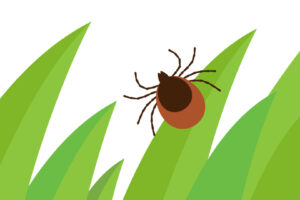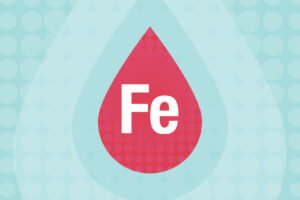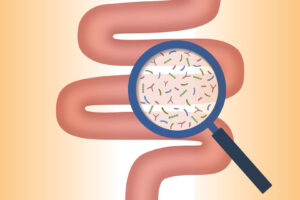Vestibular Therapy Ends Months of Debilitating Symptoms for Morganville Mom
Tara Hertling, a busy mother of two young children, ran several miles a week and had an active social life—until a freak accident threatened to upend her life.
Tara, 41, fainted on a hardwood floor while helping her daughter in the middle of the night. The Morganville mom went to the emergency department, where she was diagnosed with low blood pressure and dehydration. She received stitches in her chin and CT scans of her brain and face to rule out any other injuries. A few days later, she developed an intense headache, felt tired and dizzy, and even forgot a conversation with a friend.
“All of a sudden I felt like I was on a constant elevator with intense motion sickness,” she remembers. “I couldn’t move and had to lie down.”
Over the next seven months, Tara saw several doctors who diagnosed a variety of ailments. A neurologist diagnosed a concussion and told her to rest for a week. Still, the symptoms persisted. She stopped driving and avoided noise. She couldn’t walk with her children or help with homework.
“As each month passed, I was scared that these symptoms were permanent,” says Tara.
Finally, a second neurologist determined she had post-concussion syndrome. She then called CentraState’s OceanFirst Rehabilitation Center, where she met certified vestibular therapists Heather Murray-Miller, PT, DPT, and Olga Steinhauser, PT, DPT.
Customized Concussion Therapy
“Every concussion is like a snowflake,” Heather explains. “They affect each person differently. Because Tara had a previous concussion, this one was more severe.”
A concussion can affect multiple body control systems, including the vestibular system, which controls balance and the ability to see clearly as we move. A comprehensive evaluation showed that Tara had vestibular issues, along with problems related to other systems, like sensitivity to light and noise. Her therapy focused on exercises that addressed her specific difficulties, including retraining her eyes to work together to maintain focus. She also completed customized balance retraining, and specialized testing was performed to monitor her vital signs and concussion symptoms during physical activity.
“The stronger she got, the happier and more confident she became,” Olga says.
Tara completed therapy in June 2019 and is now back to running a few times a week and chasing after her kids.
“I will be forever thankful to Olga and Heather and truly believe they were angels placed in my life,” Tara says. “They helped me get my life back.”
For more information about rehabilitation services at CentraState, visit centrastate.com/rehab or call 866-CENTRA7 (866-236-8727).
Symptoms of Concussion
Seek medical attention if you experience any of the following symptoms after a head injury—even if it seems minor.
- Nausea or vomiting
- Headache or pressure in the head
- Balance problems or dizziness
- Double or blurry vision
- Light or noise sensitivity
- Confusion or difficulty concentrating or remembering
- Feeling sluggish, foggy, or hazy
- Feeling “not right” or “down”
Coping with Concussion: Men and Women Recover Differently
Each person will recover from a concussion differently. Women experience concussions more easily and it takes longer for them to recover, according to James Ware, MD, a board-certified neurologist.
“After a concussion, your body produces anti-inflammatory markers,” Dr. Ware explains. “For women, this process may be delayed up to a week longer than male concussion patients.”
Unfortunately, there’s no magic pill to recover from a concussion. It’s especially important that women receive personalized medical attention for their specific concussion symptoms. While women often pride themselves on being able to multitask, juggling career and other responsibilities while concussed will be challenging. Give yourself time to heal. Symptoms should resolve in three months or less for most people. If symptoms persist longer, talk to your doctor.





